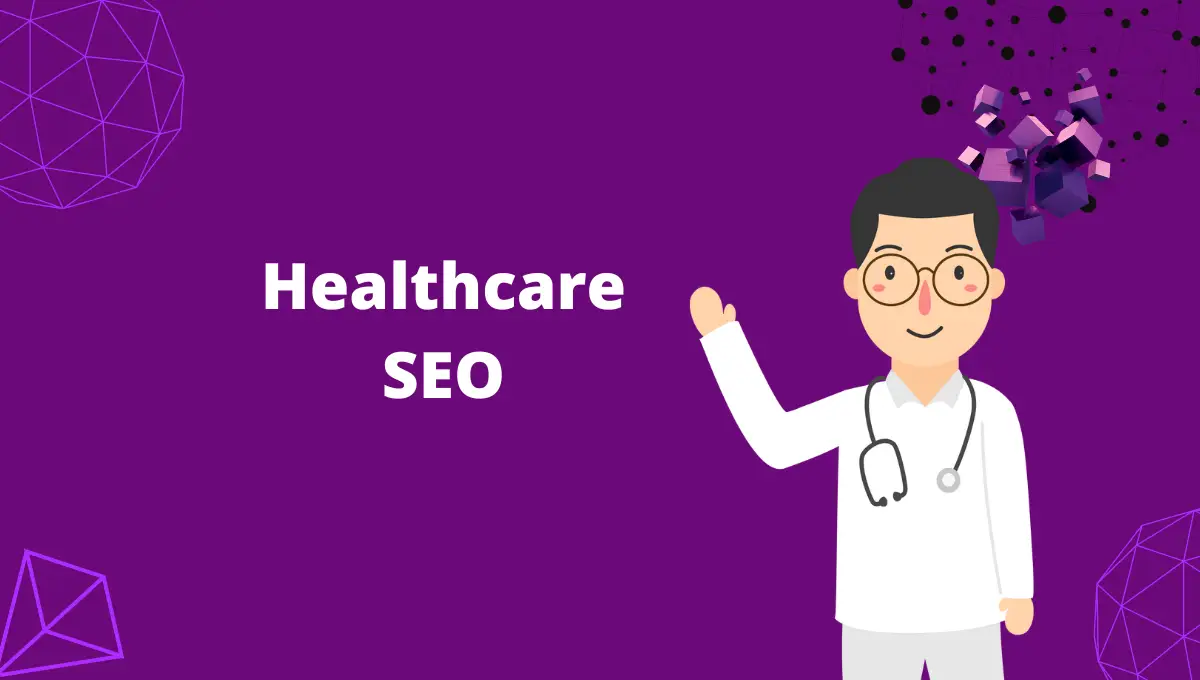Search Engine Optimization (SEO) is beneficial for any business that has a website and wishes to grow online.
Especially for competitive businesses like healthcare (hospitals), having an online presence can be very beneficial to reach patients looking for them on the Internet.
What’s the main reason a hospital should be active online? Having a quality website and optimizing it for search engines can make your organization stand out from your competitors.
You can even compete against medical institutions far bigger than you and gain more patients through SEO.
This article discusses all you need to know about optimizing your hospital’s website for search engines and ranking higher in search results. Continue reading to learn more about Healthcare SEO and its benefits.
What Is Healthcare SEO?
SEO is the process of optimizing a website so that it could rank higher on the search engine results pages (SERPs). This can ultimately lead to increased organic traffic and bring more patients for your hospitals.
Healthcare SEO uses SEO strategies to optimize your hospital’s website to rank higher on the search results and appear in front of potential patients searching for them in Google.
Patients in your area easily finding your hospital online and reaching out for the care they need. That’s the power of a winning hospital marketing strategy!
Healthcare SEO also costs much lesser than paid advertisements. Paid ads require you to spend a hefty sum every month to bring patients to your hospitals. Conversely, SEO uses search engines to reach patients who search for hospitals for treatments.
How Does SEO Work for Healthcare Organizations?
Nowadays, patients choose to visit a hospital only after sufficient research on the Internet.
So, having a website and providing your patients with all the information they need about your organization can make it easier for patients to learn more about you and visit your hospitals for treatments.
Also, when a user searches for something, Google shows the results only after going through all the web pages related to the keywords and chooses the ones that are more relevant and helpful to the user’s search query.
For example, if your potential patient searches using the term “hospitals near me,” Google goes through all the hospital websites near the location and ranks the ones that are more helpful to the users.
In such cases, optimizing your websites for search engines and making them rank higher in the search results can make it easier to appear before your patients and persuade them to visit your hospitals for treatments.
Patients also don’t consider visiting hospitals that rank on the second or third pages. Most often, they visit only the websites of hospitals that rank on the first pages. Implementing SEO strategies makes your websites rank higher and be more visible to your patients.
Why Do Healthcare Organizations Need SEO?
The first and foremost reason you should start investing in SEO is to attract more patients online and make them to visit your hospital.
As the number of people who use the Internet to search for something increases, you should also adapt and incorporate SEO to rank in the search results.
Apart from increasing visibility, SEO also has other benefits for your websites. Below are some benefits of using SEO strategies to optimize your websites.
Increase your website’s organic traffic
SEO helps your website rank higher in the search results and lets your prospective patients find it when they are searching for them. This increases the organic traffic for your website and gets more patients for your hospitals.
Show up for local searches
Another benefit of optimizing your website is that it can appear on local searches. So, whenever a person searches for “hospitals near me,” your hospital will appear in their search results.
Rise above your competitors
Medicine is a very competitive field, and the number of hospitals keeps increasing daily. In such a scenario, you should be a step ahead of your competitors and try to attract your patients online.
You can also use SEO to rank above your competitors and attract their existing audience base.
Increase the number of leads and patient appointments
People who search for hospitals online are often those who need to consult doctors for their ailments. If your websites appear before them when they search for hospitals, it will increase their chances of visiting your hospitals.
This will ultimately increase the number of leads generated and increase patient visits to your hospital.
Build credibility and authority for your website
People only trust websites with authority for their niche in search engines and are considered trustworthy by many users. Appearing on the first page of the search results instills trust in the users that your website is expert in your field.
This increases the credibility and trustworthiness of your website and increases organic traffic for you.
Steps to Follow for Healthcare SEO
SEO is an elaborate process and takes longer time than other marketing strategies to show results. It aims for long-term results by increasing your website’s visibility and increasing leads.
Here are the steps you need to follow to optimize your healthcare websites for higher ranking and maximum results.
1. Sort out all the treatments your hospital provides
Hospitals often provide different services for their patients. Before drafting an SEO strategy for your hospital, it is important to analyze and sort out the number of services the hospital provides for its patients.
Having an idea about the hospital’s treatments can help determine the keywords that need to be targeted to attract the relevant audience. It also helps when creating content for the web pages.
Understanding the number of treatments the hospital provides can also help determine the number of web pages they might need for their websites.
2. Create separate web pages for each treatment
Once the treatments provided in the hospital are sorted out, the next step is to create a website for the hospital. A website is important for any business trying to establish itself online, because it is where the customers learn about them and their services.
Creating a separate web page for each treatment can allow hospitals to provide all the necessary information regarding each treatment. It also allows potential patients to learn more about each treatment and decide whether the hospital provides the treatment for their ailment.
3. Set up a Google Business Profile for your hospital
No matter what kind of business, it needs a Google Business Profile to take its brand to its customers. Google Business Profile (GBP) is the updated version of Google My Business (GMB), through which hospitals can let their audience know more about their services.
Getting listed on GBP allows hospitals to increase their visibility and appear in front of their audience when they search them on Google, Google Maps, and other services provided by Google.
Hospitals should keep their GBP updated and provide all the necessary information about their services, including their clinic’s location, contact details, working hours, treatments they provide, images, videos, patient reviews, and other details.
All these information are provided to make it easier for patients to learn about the hospitals and visit them for treatments.
4. Conduct an SEO audit on your website
SEO audits are an important part of optimizing your websites for great user experience. They are performed to identify web pages that are performing well and those that need improvements.
SEO audits analyze various aspects of the hospital’s web pages and identify areas that are lacking and need improvements to get them ranked in the search results.
Some aspects of web page that undergo SEO audit are
- site speed,
- page loading speed,
- web page indexing,
- mobile friendliness,
- hosting features,
- responsiveness, etc.
5. Understand your competitor’s websites
Competition is inevitable in any kind of business. Hospitals, too, have competitors who fight for the patients around them. When it comes to online platform, competitors are those hospital websites that rank in the top 10 positions for keywords that your hospitals focus on.
For example, if a hospital is focusing on ranking for the keyword “hospitals near me,” the top 10 websites that appear on the first page of the search results for this search are its competitors.
Conducting a competitor analysis can help hospitals identify who their main competitors are and what strategies they follow to rank in the search results.
Conducting a holistic competitor analysis on competitors can help
- identify new areas of improvement in the website,
- understand the competitor’s strengths and weaknesses,
- understand the strategies they use to reach potential patients, and
- implement their method and create new strategies to get the desired results.
6. Keyword research
Hospitals should identify the keywords they want to rank for before creating content for their website. Keywords are the search terms users use to search for something on the Internet.
Google is designed to provide users with the most relevant and helpful content. To get ranked for a keyword, hospitals need to make Google understand that their website is relevant to what the users are searching for.
Keyword research is an important step to undergo before starting to create content for websites. Hospitals can use keyword research tools like Semrush or Google Keyword Planner to get the most relevant keywords for their practice.
Hospitals can use these keywords in their content and other areas of the website to rank in the search results and reach prospective patients looking for hospitals or the treatments they provide.
7. Develop content structure
After conducting competitor analysis and analyzing relevant keywords, the next step would be to develop a content structure for the web pages. This can make things far easier for search engines and the users to understand the crux of the content.
This allows Google to crawl and rank web pages higher than competitors. The content’s rank and readability improve as the content structure improves.
8. Create helpful content for your potential patients
Google only ranks web pages that provide relevant and helpful content to its readers. To rank higher in Google, hospitals should create content that satisfies their reader’s needs.
Many people assume content marketing is all about writing blogs for their websites. While blogs are essential in content marketing, they are not the only type of content that hospitals can use on their websites.
Hospitals can also create content related to their field in other formats like
- case studies,
- video content,
- surveys,
- FAQs,
- resources,
- webinars,
- medical updates, etc.
Building authority in a niche is very important for a website, especially in the medical industry. Hospitals should aim to create as much content as possible on topics relevant to their services and build authority for their websites.
9. Optimize on-page components
On-page SEO is what brings countless new prospects to your website. After all the website optimization, get on with optimizing all the on-page components for maximum results.
On-page optimization is important for a hospital’s website, because it adds value to their prospective patients and allows Google to understand what the website is all about. They optimize the website for both search engine bots and the audience.
Here are some on-page components that hospitals can focus on while optimizing their web pages for higher ranking.
HTML Meta Tags
- Title
- Meta description
- Headers (H1)
- Subheaders (H2, H3, etc.)
- Canonical URL
- Robots Tag
Uniform Resource Locator (URL)
The URL is the address of any website that can help search engines identify and understand the relevancy of a web page. The keywords placed in the URLs are one of the Google’s ranking factors.
Image Optimization
- The images should be less than 100kb.
- Use Alt Text for images and place relevant keywords in them.
- The images should be in WebP or AVIF formats.
Links
The internal links (links to other pages of your website) and external links (links from other websites that are relevant to your niche) are used to share your website’s authority to other pages.
10. Develop a good link-building strategy
Backlinks are one of the Google’s ranking factors, and they help build authority for a website and rank the website higher on search engines. This can get you more organic traffic and get more patients to visit the hospitals.
There are some ways to build links for a website.
- Guest posts
- Directories
- Working on a listicle
- Press Release (PR)
- Help a Reporter Out (HARO)
Just because you want to build backlinks for your website doesn’t mean you can get them from any website. There are some criteria you need to follow before choosing a backlink. Below are Google webmaster guidelines for choosing a backlink for your website.
- Choose a website that is relevant to your niche.
- Its organic traffic should be more than 1000 per month.
- It should have organic traffic for relevant keywords of our industry.
- Its relevant domains should be higher than outbound domains.
- It should not participate in link scheme.
- Its organic traffic and referring domains should not be falling at the same time.
11. Ensure all your web pages get indexed
Once all the aspects of a website are optimized and fixed, the next step would be to make sure that the web page gets indexed by Google. Only when Google indexes a web page, it can be ranked and found by the users.
Here’s the process of how Google indexes a web page.
- Crawling: Google bots crawl and scan the web pages to understand relevancy of the content.
- Indexing: Google analyzes and stores the web pages in the database.
- Ranking: Google algorithm searches for and picks the webpages that are most relevant to the user’s search intent from the database.
12. Fix core web vitals
Once your web pages are indexed, start working on fixing the Core Web Vitals (page experience). Core Web Vitals are a metric that is used to measure the page experience of a web page on both mobile and desktop devices.
There are three attributes that are used to measure the Core Web Vitals of a web page.
- Largest Contentful Paint (LCP), which measures the loading speed of a web page
- First Input Delay (FID), which measures the page interactivity
- Cumulative Layout Shift (CLS), which measures the visual stability of the page
These three metrics are very essential for Google Page Experience. So, ensure you optimize these three factors to get ranked in search results and give your users the best page experience.
13. Analyze your website’s performance
There are hundreds of tools and metrics that you can use to analyze your website’s performance. Google algorithm has over 200 ranking factors to rank a website on the first page.
Some of the aspects that you need to analyze in regard to the performance of a website are
- organic traffic,
- keyword ranking,
- SERP visibility,
- click-through rate (CTR),
- bounce rate,
- website authority over time,
- backlinks,
- page speed,
- time spent on a page, and
- conversion rate.
SEO is a never-ending process; you need to optimize them regularly to get the best results. You need to improve your website repeatedly until it appears in the featured snippets.
Conclusion
SEO is an effective marketing strategy that gives you slow but steady results. It is the strategy that most businesses use to get organic traffic and get more quality leads for their products and services.
If you own a hospital and wish to establish it on online platforms, creating a website and working on improving it is the first step. If you are new to SEO or don’t have time to do them, you can always seek the help of digital marketing agencies that can provide you with expert SEO services.
Frequently asked Questions:
Nowadays, patients choose to visit a hospital only after sufficient research about them on the Internet. So, having a website providing all the information they need about your organization can make it easier for patients to learn more about you and visit your hospitals for treatments.
Healthcare SEO uses SEO strategies to optimize your hospital’s website so that it would rank higher on the search results and appear in front of potential patients who are searching for them in Google.
Healthcare SEO also costs much lesser than paid advertisements. Paid ads require you to spend a hefty sum every month to bring patients to your hospitals. SEO, on the other hand, uses search engines to reach patients who search for hospitals for treatments.













